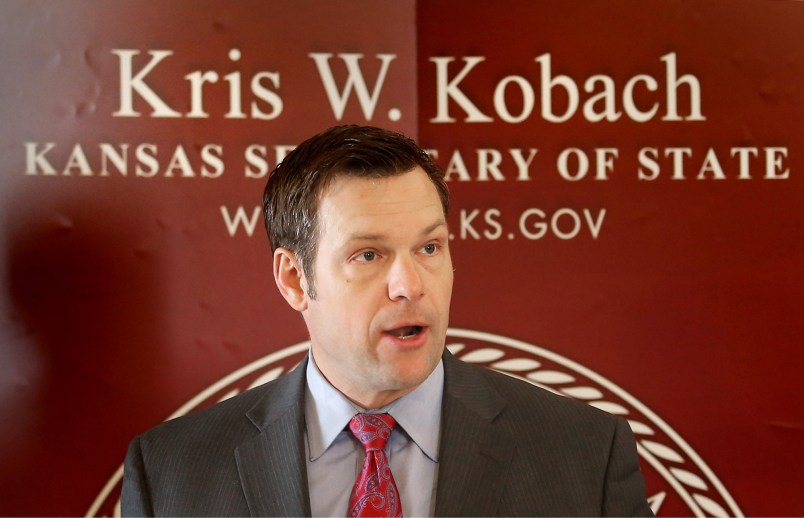Kansas Secretary of State Kris Kobach and the civil rights groups and voters suing him over the state’s proof-of-citizenship voter registration requirement appear to have come to an agreement in a dispute over how the state had been implementing a court ruling blocking that restriction, court documents filed Thursday by the ACLU show.
The agreement was reached ahead of a hearing scheduled for Friday, where Kobach had been ordered to explain why he should not be held in contempt of court.
“Defendant will instruct the county election officials to send out a new notice that
unequivocally advises covered voters that they ‘are deemed registered and qualified to vote for the appropriate local, state, and federal elections for purposes of the November 8, 2016 general election, subject only to further official notice,'” the agreement reads.
The agreement lays out the terms for an “interim” deal, specifically for November’s elections. Both sides of the dispute said that it does not affect their legal posturing towards the original injunction.
The dispute had arisen after U.S. District Judge Julie Robinson placed a preliminary injunction on the proof-of-citizenship requirement in May, and ordered that all voters whose registrations had been suspended or cancelled because of that restriction be registered to vote in federal elections.
In a separate lawsuit in Kansas state court, a Shawnee County district court judge later said those voters whose registrations were affected by the proof-of-citizenship requirement also should be allowed to vote in state and local elections.
According to documents filed by the requirement’s challengers last Friday, the 18,000 voters affected by the injunction had not been added to the official voter rolls yet. The challengers said that when one of the voters involved in the lawsuit searched for his name on Kansas’ online voter registration database, it did not come up, nor was his registration showed as complete when he called his local clerk asking for the status of his registration.
Those documents also said that election officials had been instructed to have voters who registered without proof of citizenship vote by provisional ballot, instead of the standard ballot.
Kobach had countered that Robinson’s order only applied to federal elections and not to registration for state and local elections, according to a letter from his office to the ACLU included among the court filings.
The challengers asked the judge to direct Kobach to add the voters to the state’s official poll books, give them notice that they may vote in all elections, and allow them to vote by standard ballot, while urging the judge to hold Kobach in contempt of court.
Robinson on Monday granted a hearing on the challengers’ concerns.
On Wednesday, Robinson ordered that Kobach bring to Friday’s hearing”a draft of the notice” that a Shawnee County judge had ordered last week notifying affected voters that they were eligible to vote in local, state and federal elections.
In the proposed agreement laid out in Thursday’s filing, Kobach agreed to send the notice, allow affected voters to vote by standard ballot rather than provisionally, and update the online public database with those voters’ information. However, the state will be allowed to mark within its internal database which voters registered without proof of citizenship. The state will also be allowed to list those voters’ names in a secondary pollbook in counties that keep paper pollbooks, with elections workers instructed to check the secondary list if a voter’s name is not present in the principal pollbook.
“Defendant has represented to Plaintiffs’ counsel that he hesitates to place
covered voters on the principal list of registered voters because he wishes to retain flexibility to remove them should a higher court reverse the Order,” the challengers say in the agreement. “Plaintiffs believe this is an improper attempt to circumvent full compliance with the injunction and achieve a de facto stay.”
Kobach was able to outline the state’s legal position in the agreement regarding the dispute.
“Defendant respectfully suggests that a hearing on September 30, 2016, is no longer necessary, and that Defendant Kobach should not be held in contempt,” the filing read.
Read the full agreement below:







That’s some byzantine shit, right there…I’m sure the voters will be none the wiser if Kobach gets even a slight way towards his achieving any objective in suppressing Democratic votes. Thanks ACLU. You really caved on this asshole. He should’ve been left to be held in contempt imo. That’s how most of the country feels about him anyway.
Kris Kobach is evil. He likes to write laws and get them inacted in states other than his own. He wrote SB1070 the Arizona “papers please” law.
Just a nasty man.
If I were a vindictive soul I would make Kobach have to personally go to every affected voter and apologize. Not gonna happen but I can dream can’t I?
So they kind of got to disprove the need for proof by not having to prove what was previously verifiable proof.
One thing is for sure, Kobach has motivated at least 18,000 voters to show up and vote against everything that he stands for.
What is Kobach’s actual job?